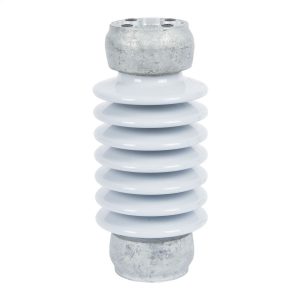
When it comes to the safe and reliable transmission of electrical power, one crucial component often overlooked is the humble porcelain insulator. These inconspicuous devices play a vital role in ensuring the efficient flow of electricity while safeguarding against dangerous electrical faults. In this article, we will delve into the world of electrical porcelain insulators, highlighting their construction, benefits, and applications in various industries.
Understanding Porcelain Insulators
Porcelain insulators are ceramic devices designed to provide electrical insulation and mechanical support for overhead power lines and electrical equipment. They are primarily made of high-quality, durable porcelain, a non-conductive material known for its excellent electrical and mechanical properties. Porcelain is chosen for its high resistance to heat, corrosion, and electrical stress, making it ideal for withstanding the demanding conditions encountered in electrical systems.
Construction and Design
Porcelain insulators consist of several key components that work together to ensure effective insulation and mechanical stability. The three main parts of a porcelain insulator are:
- Insulating Core: The insulating core forms the heart of the porcelain insulator and is typically made of porcelain or steatite. Its primary function is to provide electrical insulation, preventing the flow of current between the conductive parts.
- Metal Fittings: Metal fittings, usually made of galvanized steel or aluminum, are attached to the insulating core. These fittings provide mechanical support, allowing the insulator to be securely attached to power lines or electrical equipment. Metal fittings also offer electrical conductivity, facilitating the proper flow of electricity.
- Glaze Coating: The outer surface of porcelain insulators is coated with a glaze, typically made of silica and other minerals. The glaze serves two essential purposes: enhancing the insulator’s electrical resistance by providing a smooth, non-conductive surface and protecting the insulator from environmental factors such as moisture, pollution, and UV radiation.
Benefits of Porcelain Insulators
- High Electrical Insulation: Porcelain insulators possess excellent electrical insulation properties, effectively preventing the flow of electricity along their surfaces. This characteristic is crucial for maintaining safe and reliable electrical transmission, reducing the risk of electrical leakage and short circuits.
- Mechanical Strength and Durability: Porcelain insulators exhibit remarkable mechanical strength, enabling them to withstand the weight of overhead power lines and endure extreme weather conditions. Their sturdy construction ensures long-lasting performance and minimizes the need for frequent maintenance, leading to cost savings in the long run.
- Resistance to Environmental Factors: Porcelain insulators are designed to withstand harsh environmental conditions such as temperature variations, high humidity, pollution, and UV radiation. The glaze coating on the surface acts as a protective barrier, preventing moisture absorption and reducing the risk of surface flashovers.
- Fire and Heat Resistance: Porcelain insulators possess inherent fire resistance, making them suitable for high-temperature applications. Their ability to withstand heat ensures the uninterrupted flow of electricity, even in demanding environments such as power plants or industrial settings.
Applications of Porcelain Insulators
Porcelain insulators find widespread use in various industries and applications, including:
- Power Transmission and Distribution: Porcelain insulators are commonly employed in overhead power transmission lines to support and insulate the conductors. They ensure the safe and efficient transmission of electricity over long distances.
- Substation Equipment: Porcelain insulators are used in electrical substations to insulate and support equipment such as circuit breakers, transformers, and bus bars. They provide insulation against high voltages and mechanical stability to withstand operational stresses.
- Electrical Equipment: Porcelain insulators are integral components of electrical equipment such as switches, isolators, surge arrestors, and lightning arrestors. They isolate and protect conductive
